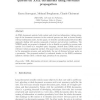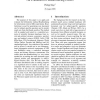113
Voted
JIS
2008
15 years 17 days ago
2008
This paper is a personal take on the history of evaluation experiments in information retrieval. It describes some of the early experiments that were formative in our understandin...
IS
2006
15 years 18 days ago
2006
As XML documents contain both content and structure information, taking advantage of the document structure in the retrieval process can lead to better identify relevant informati...
97
Voted
IJDAR
2006
15 years 18 days ago
2006
Tables are a ubiquitous form of communication. While everyone seems to know what a table is, a precise, analytical definition of "tabularity" remains elusive because some...
98
Voted
IR
2008
15 years 18 days ago
2008
The classical Probability Ranking Principle (PRP) forms the theoretical basis for probabilistic Information Retrieval (IR) models, which are dominating IR theory since about 20 ye...
112
Voted
IPM
2008
15 years 18 days ago
2008
Users enter queries that are short as well as long. The aim of this work is to evaluate techniques that can enable information retrieval (IR) systems to automatically adapt to per...
77
Voted
IPM
2008
15 years 18 days ago
2008
This paper examines the estimation of global term weights (such as IDF) in information retrieval scenarios where a global view on the collection is not available. In particular, t...
IPM
2008
15 years 18 days ago
2008
Forty-eight years ago Maron and Kuhns published their paper, ``On Relevance, Probabilistic Indexing and Information Retrieval" (1960). This was the first paper to present a p...
101
Voted
DAM
2008
15 years 21 days ago
2008
This paper presents an algebraic formalism for reasoning on finite increasing sequences over Boolean algebras in general and on generalizations of Rough Set concepts in particular...
95
Voted
DKE
2010
15 years 21 days ago
2010
An ontology is a formal conceptualization of a domain, specifying the concepts of the domain and the relations between them. It is however not a straight forward task to use this ...
85
Voted
CORR
2008
Springer
15 years 21 days ago
2008
Springer
The purpose of this paper is to apply and evaluate the bibliometric method Bradfordizing for information retrieval (IR) experiments. Bradfordizing is used for generating core docu...


